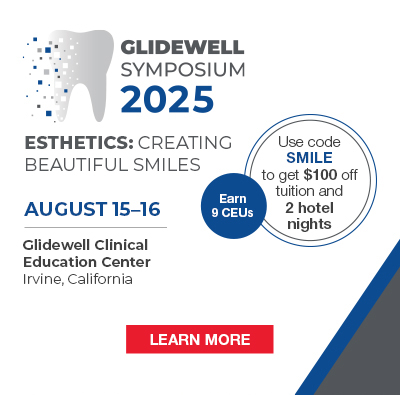In First Impressions George Freedman, DDS, gives readers a brief summary of products that have recently been introduced to dentistry, based on his clinical experience.
|
OralCDx BrushTest |
   
Oral cancer has not demonstrated a decrease in mortality rates over the past century of documentation. The major reason for this is that oral cancers are typically detected late in their progress. By the stage an oral lesion actually appears suspicious during routine examination, it may be dangerous and possibly life-threatening. The typical at-risk population consisted of older males who drank and smoked heavily. Today, this risk-group is more generalized, including younger women and men and nonsmokers. In fact, at least 25% of oral cancer patients have no known risk factors. Fortunately, visible light detection techniques have popularized the need for earlier efforts in the detection of oral cancers and at-risk tissues. These methods, however, cannot rule out the actual presence of dysplasia or cancer. OralCDx Laboratories’ OralCDx BrushTest is a noninvasive, easy-to-administer method for ruling out the presence of dysplasia, which is often visible but blends with common tissue variations. The early diagnosis of dysplasia, while it is still harmless, is the key to preventing oral cancer. Dysplasia and cancer differ in that dysplastic precancerous cells are contained above the basement membrane and are essentially harmless. Cancer cells have penetrated below the basement membrane and can now spread. The BrushTest procedure begins with a visual diagnosis of epithelial color variation, with a visible diagnostic light or directly. The OralCDx brush is swabbed on the suspicious site to help rule out dysplasia. Cellular material is then transferred to the slide, fixed, and then sent to OralCDx, the world’s largest specialized oral pathology lab. The process uses advanced pathology and computer science to analyze each specimen and provides a detailed lab report as well as personalized follow-up support. When diagnosed early and treated, oral cancer can be prevented, in most cases. For more information, call (877) 712-7874 or visit oralcdx.com.
|





 Ah, the joys of the intraoral injection. Dental anesthesia has made dentistry comfortable enough for the vast majority of the population such that dentistry and dental treatment are no longer as feared or disliked as they once were. However, this dental fear (or phobia) has, for many patients, transferred into an apprehension and dislike of the dental injection itself. Typically, the dental injection is the precursor to minor dental/oral surgery (restorations, endodontics, periodontics, and gingival curettage, among others) numerous times every single day. For the patient, the injection is a sharp, pointy object penetrating the soft, sensitive tissues as it delivers the anesthetic. Transcodent has introduced its Transcodent Painless Steel Dental Injection Needles. They are single-use sterile needles for delivering dental anesthesia. The needles are ground to a 3-edged lancet that allows them to readily penetrate the tissues. Less trauma upon penetration means less discomfort for the patient. Further, the canula is siliconized to make its glide through the tissues smoother and less uncomfortably for the patient. As expected, patients generally report that the Painless Steel Needles seem to cause less discomfort than earlier products. Painless Steel Needles undergo ethylene oxide sterilization and are delivered in a heat-sealed needle container to eliminate possible contamination. The bevel mark on each syringe provides optimal syringe positioning for the dentist. Painless Steel Syringes are available in 3 gauges: 25, 27, and the practical 30. They are also offered in short and long in 25 and 27 gauge and the short and very useful extrashort (13 mm) in the 30 gauge. Transcodent Painless Steel Dental Injection Needles are dental injections made more comfortable. For more information, please visit the Web site painless-steel.com. For distributors, please contact Patterson Dental at (800) 873-7683 or pattersondental.com; Benco Dental at (800) GO-BENCO or benco.com; or Burkhart Dental Supply at (800) 562-8176 or
Ah, the joys of the intraoral injection. Dental anesthesia has made dentistry comfortable enough for the vast majority of the population such that dentistry and dental treatment are no longer as feared or disliked as they once were. However, this dental fear (or phobia) has, for many patients, transferred into an apprehension and dislike of the dental injection itself. Typically, the dental injection is the precursor to minor dental/oral surgery (restorations, endodontics, periodontics, and gingival curettage, among others) numerous times every single day. For the patient, the injection is a sharp, pointy object penetrating the soft, sensitive tissues as it delivers the anesthetic. Transcodent has introduced its Transcodent Painless Steel Dental Injection Needles. They are single-use sterile needles for delivering dental anesthesia. The needles are ground to a 3-edged lancet that allows them to readily penetrate the tissues. Less trauma upon penetration means less discomfort for the patient. Further, the canula is siliconized to make its glide through the tissues smoother and less uncomfortably for the patient. As expected, patients generally report that the Painless Steel Needles seem to cause less discomfort than earlier products. Painless Steel Needles undergo ethylene oxide sterilization and are delivered in a heat-sealed needle container to eliminate possible contamination. The bevel mark on each syringe provides optimal syringe positioning for the dentist. Painless Steel Syringes are available in 3 gauges: 25, 27, and the practical 30. They are also offered in short and long in 25 and 27 gauge and the short and very useful extrashort (13 mm) in the 30 gauge. Transcodent Painless Steel Dental Injection Needles are dental injections made more comfortable. For more information, please visit the Web site painless-steel.com. For distributors, please contact Patterson Dental at (800) 873-7683 or pattersondental.com; Benco Dental at (800) GO-BENCO or benco.com; or Burkhart Dental Supply at (800) 562-8176 or 


